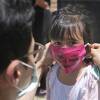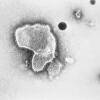Once again, we're facing a holiday season in which COVID-19 is a concern. And there are other viruses circulating that doctors worry could really spread over the next several weeks, including respiratory syncytial virus and the flu. Reporter Craig LeMoult broke things down with GBH’s Judie Yuill. This transcript has been lightly edited.
Judie Yuill: First of all, can we get a quick update on how COVID-19 is looking in Massachusetts right now?
Craig LeMoult: Yeah, we're really in a much better place now than we were in the spring or even this time last year. The seven-day average number of cases is around 700 in the state, although experts warn that's probably a huge undercount because many people are getting testing at home and they don't report those results. So the good news is the wastewater data, which has been a more reliable signal, is trending down around the state.
But it's important to remember that people are still dying of COVID in Massachusetts. In the last week that the state reported, there were 83 people who died of COVID.
I talked with Dr. Bisola Ojikutu. She's the executive director of the Boston Public Health Commission. And she had a warning.
[Recorded clip] “The pandemic is not over. There are a number of important strategies that we need to utilize this holiday season to decrease our risk of infection, whether it be COVID-19 or other respiratory viral infections — RSV and the flu — which are causing problems. You know, a lot of people are being hospitalized with severe illness and requiring intensive care.”
So as you mentioned, we're not just talking about COVID anymore. There's a concern about what's being called the "triple-demic" of COVID, the flu and RSV.
Yuill: With all that, should people consider canceling their Thanksgiving plans?
LeMoult: You know, Dr. Jake Lemieux was asked that question in a press call today. He's an assistant professor at Harvard Medical School and an infectious disease specialist at MGH. He said we don't really have the all-clear for Thanksgiving this year.
[Recorded clip] “But I also don't think it's fair to say that, you know, Thanksgiving needs to be canceled this year. We've been living with respiratory disease activity from a potentially lethal virus for some time now, and I think people should continue to do what they've been doing while also recognizing that certainly risk factors are there for transmission and there's a lot of viral activity ongoing at the moment.”
Yuill: So what steps can people take to try to reduce the risk of spreading these viruses over the holidays?
LeMoult: Well, the first thing that experts recommend is getting vaccinated — and that means getting the latest COVID booster if you've already had the initial shot regimen — as well as getting a flu shot. In the latest state COVID vaccine report, which came out Wednesday night, about a quarter of Massachusetts residents in their fifties had gotten their second booster shot. That went down to 16% for people in their forties, 13% for people in their thirties, and it's just single-digit percentages for people younger than that. Doctors say those updated boosters are really necessary to help keep up immunity. And Dr. Ojikutu from the Boston Public Health Commission told me while the city has done a good job of erasing racial and ethnic disparities in the original vaccine regimen, those disparities are persisting when it comes to booster shots.
Another important thing to do is taking rapid antigen tests for COVID before getting together for Thanksgiving. Dr. Lael Yonker, who's an assistant professor at Harvard Medical School and a pediatrician at MGH, had some advice for other things to do before getting together.
[Recorded clip] "If you have a cold, you know, definitely test for COVID, but it could be RSV, so maybe you should consider who's going to be there and just help protect the youngest, most vulnerable [from] some of these respiratory illnesses. And if you're going to be traveling, I personally would encourage people to wear masks on airplanes.”
Yuill: What about the RSV problem? There's no shot for that one. What's been the impact?
LeMoult: Yeah, Dr. Yonker said they're seeing a lot of this at MGH.
[Recorded clip] “Not just our hospital. Hospitals across New England, across the United States, are filled. The ICUs are filled. We have meetings as a hospital locally with regional hospitals [on] where can we shift beds? We have to postpone pediatric elective surgeries.”
Dr. Ojikutu pointed out that on top of everything else, hospitals are facing staffing shortages, which is adding to the stress on the system. She said families who have kids infected with RSV can help alleviate some of the overcrowding.
[Recorded clip] “If your child is ill, but they're still active, they're drinking fluids, they're not having difficulty breathing, call your primary care provider for advice first. You don't necessarily want to bring your child in to be tested in an emergency department because that creates increased work and it’s just a lot of strain on our system.”
Of course, if symptoms are getting worse or a child is having any difficulty breathing, you do want to bring your kid to the E.R.
One thing actually I ran into this week: My son just had an ear infection and was prescribed the antibiotic amoxicillin, and it’s just not to be found anywhere. There's a national shortage right now of amoxicillin, and it's related to prescriptions for RSV.
Yonker explained that even though RSV is viral, patients can get bacteria in their lungs and that's treated with antibiotics. Fortunately, there are alternative antibiotics that can be prescribed, but the shortage, I think, really speaks to the scope of this RSV problem.









